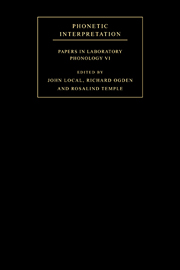Book contents
- Frontmatter
- Contents
- List of contributors
- Acknowledgements
- Introduction
- Part I Phonological representations and the lexicon
- 1 Interpreting ‘phonetic interpretation’ over the lexicon
- 2 Effects on word recognition of syllable-onset cues to syllable-coda voicing
- 3 Speech perception, well-formedness and the statistics of the lexicon
- 4 Factors of lexical competition in vowel articulation
- 5 Commentary: probability, detail and experience
- Part II Phonetic interpretation and phrasal structure
- Part III Phonetic interpretation and syllable structure
- Part IV Phonology and natural speech production: tasks, contrasts and explanations
- References
- Index of names
- Index of subjects
4 - Factors of lexical competition in vowel articulation
Published online by Cambridge University Press: 22 September 2009
- Frontmatter
- Contents
- List of contributors
- Acknowledgements
- Introduction
- Part I Phonological representations and the lexicon
- 1 Interpreting ‘phonetic interpretation’ over the lexicon
- 2 Effects on word recognition of syllable-onset cues to syllable-coda voicing
- 3 Speech perception, well-formedness and the statistics of the lexicon
- 4 Factors of lexical competition in vowel articulation
- 5 Commentary: probability, detail and experience
- Part II Phonetic interpretation and phrasal structure
- Part III Phonetic interpretation and syllable structure
- Part IV Phonology and natural speech production: tasks, contrasts and explanations
- References
- Index of names
- Index of subjects
Summary
Introduction
Understanding sources of variability in spoken language is one of the most important challenges that face speech researchers today. Traditionally, variability had been treated as noise to be controlled or ignored in studying spoken language; however, there has recently been an increasing interest in exploring lawful variability in spoken language. For example, Byrd (1994b) found that sex and to a lesser degree dialect differences resulted in between-talker differences in the degree of reduction along a number of dimensions including speech rate, stop release, flapping and quantity of central vowels. In addition to inter-talker differences which might be viewed as talker- or group-specific constants, there are many forces that act on spoken language that may change the way a word is pronounced from one utterance to the next by the same talker.
Reduced and clear speech processes represent a significant source of within talker variability, much of which has been attributed to talkers varying their pronunciation to accommodate the communicative needs of the listener (e.g., Anderson, Bard, Sotillo, Newlands and Doherty-Sneddon 1997; Bolinger 1963; Lieberman 1963; Lindblom 1990). In these studies talkers have been shown to produce more reduced speech when contextual information within the utterance or in the environment can aid the listener in recognising what is said, and to produce more careful speech when the talker is aware of conditions that may impede the listener's ability to understand what is said.
- Type
- Chapter
- Information
- Phonetic InterpretationPapers in Laboratory Phonology VI, pp. 75 - 87Publisher: Cambridge University PressPrint publication year: 2004
- 5
- Cited by



